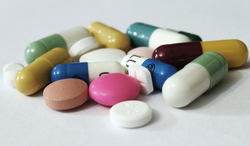 Image: e-Magine Art
Image: e-Magine Art that prompts soul searching about whether we, as a nation, are
addicted, or ill or weak (in part; sometimes; and probably not).
I can't answer the big questions about the nation's mental health.
But I can tell you what it's like to go onto antidepressants - and to
come off them.
(for a fantastic illustration of that, see this comic). I agree with that 100%.
I also totally believe that medication can be really helpful in treating depression, and that there shouldn't be any
stigma attached to taking drugs that help you to manage any mental illness. I'm not sure I entirely agree
that a corollary argument - that you should never question the use of medication for depression - is right.
I am pretty much only talking about depression and anxiety here, rather than any other mental illness,
because that's the only one I have personal experience of. I want to make that clear because I often see
'mental illness' bandied about as if schizophrenia and OCD and bipolar are pretty much the same and can be
treated the same way. They can't. Often different people with the exact same diagnosis need very different
treatments - that's one area where the analogy with physical illness breaks down.
| 189,851 people were diagnosed with depression for the first time between 1993 and 2005, and almost 80% of them were prescribed anti-depressants. Was that the best possible treatment for every single one of those people? Probably not, let's face it. | When I was prescribed |
What I do remember is him carefully outlining what the experience of starting to take these drugs would be like
- the likely side effects and feelings - and when I should come back in. So when I felt the leg tremors and the
night sweats and the other side effects I didn't panic and stop before I'd started because I was expecting
them, and I'd been told they wouldn't last more than a few weeks.
And at some point, gradually, they stopped, and the mood altering properties kicked in, and slowly things
began to feel better. And I became one of the millions of people picking up my prescription. Coming off was
a different matter.
I knew it was going to be unpleasant because I can be disorganised and sometimes I'd forget to take my pills.
One day off would be ok, but after two I would start to feel ill, like the edge of a really bad flu. I'd flush hot
and then cold. My skin got clammy. I felt sick. I got strange sensations in my head like electric shocks, or
feeling like when I moved my head too quickly or blinked my head was full of iron filings that shuffled around
in reaction to the movement.
The worst time was when I forgot to take them with me over Christmas, and my partner had to drive me to
a chemist on Boxing day, after 5 days medication Âfree, sweating and shaking and permanently on the edge of
tears, to get an emergency prescription.
To be fair, you are told not to just stop taking antidepressants. When I decided, for a variety of reasons, to
stop taking them, I was advised to gradually cut the dose in half, then half again and so on to make it
easier. It must have made it a little easier, but I was shocked about the extent to which I still felt all of the
side effects.
It took me several months to come off and there were loads of times I almost stopped and just went back up
to my full dose because I was finding it so difficult to cope with feeling as if I had flu.
I wanted information about how long this might last. About whether most people got the same effects.
Whether there might be others. I couldn't find them. The most I could get was anecdotal evidence from
people on forums, and vague lists of side effects along with the mantra that it differs from person to person.
A more cynical person might imply here that the huge companies which produce these drugs have more to
gain from being upfront about the initial side effects than the effects of discontinuation.
I was only really able to come off because I had a supportive workplace, which let me work from home or take
days off when I was struggling, and because I had found, and been seeing for while, a fantastic counsellor.
That puts me in a small, incredibly lucky, minority. How many people can never access decent talking therapies
and are left to struggle on with medication which helps a little but doesn't cure?
Any health service - any government, essentially - which really cared about the wellbeing of the people living
in that country would invest hugely in providing talking therapies and other alternatives. Ours doesn't.
Squeamish Louise


 RSS Feed
RSS Feed
